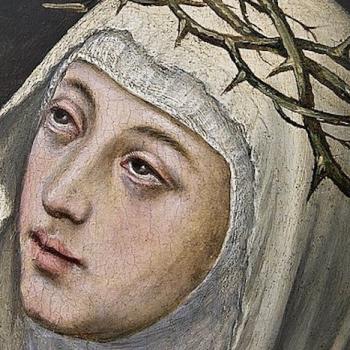
A Patheos reader sends us this question. When it comes to faith, the ground level question is often the one to ask. Christians gather to baptize in Jesus’ name and preach from the Bible about his life, death, and resurrection. We celebrate his birth by pulling out all the stops. We attempt to live lives that, through integrity and generosity, are faithful to his. But why is Jesus of Nazareth so important?
Can Anything Good Come from Nazareth?
Consider the “of Nazareth” in the question. Jesus came from a town, and the townspeople knew both him and his parents. Part of the scandal, the way John tells the story, is that he wasn’t obviously more important than anyone else who came from that town (6:42). And his town wasn’t obviously any more important other towns (1:46). What’s so special about Nazareth? And what’s so special about the son of Mary and Joseph of Nazareth?
Two Ways of Telling One Story
I want to answer that question in two ways.
1. Jesus of Nazareth, the Unspecial Human
The first, and maybe surprising answer, is “nothing at all.” Nazareth is not the gravitational center of the universe, and Jesus is simply a human like everyone else born there. This is what theologians sometimes call “the scandal of particularity.” To see this one human person as universally meaningful and worthy of worship? That seems to land somewhere on a spectrum between ridiculous and offensive.
Indeed, this scandal characterizes the whole story of the Bible, from the moment God chooses a particular people to be the mediators of his healing work (Genesis 12:1-9). But that expanded question will have to wait for another post.
Jesus the Socialite
Jesus was the son of Mary of Nazareth, and there’s nothing that marks him out as anything other than a human among billions of humans. That in fact, paradoxically, is the first thing that is important about him. He is “like us in all things,” one important definition from the early church puts it. Jesus did all the “unspecial” things that humans do. He made friends, talked with strangers, and led a life so social that some dismissed him as a party animal (Matthew 11:19).
Thomas Aquinas says that this social life is part of how he saves. People get to know him, find connection, and come to see that his human presence in their lives is meaningful, life-changing, and saving.
In that case, though, the importance of Jesus of Nazareth goes beyond mere relatability. His importance is more than saying “Jesus was quite popular.” His humanity allows him to become the precise salvation that each person finds that they need.
Jesus the Human Healer
Consider for instance the story of the Syrophoenician woman in Mark’s gospel. I talk about her story in my book of introductory theology. She knows what healing her family needs, and she won’t take no for an answer from Jesus. It’s as if she says, “if you cannot save us, no one can. So it’d better be you.” And Jesus can. And he does.
If he were a demigod or a spirit wafting down the streets of her Mediterranean coastal town, this story would have gone differently. It is his unspecial humanity that allows her to argue back, and even to do a little improvisational work with his offensive metaphor about dogs and tables. A super-human savior could heal with a look or a snap of the finger. A human savior heals through human connection. Even a bit of human rudeness!
2. Jesus of Nazareth, the Word of Heaven
What are the limits of his meaningfulness? This is the question that moves us toward the second way of telling his biography. In the New Testament’s presentation, there simply are no boundaries. The sick and the poor, the cheaters and the rich. Children and the elderly. Roman soldiers and bent over Jewish women. Trees, pigs, wind, and waves: all listen to his voice.
This is why he can say in John something so strange and contradictory. Yes, I am from Nazareth, but I am also sent from heaven (6:29). Mary of Nazareth was Jesus’ mother, we say. But we also say, and without saying something different, that she is God-bearer. Why would we say that?
The Single-Minded Love of God
It’s because, again, it is possible to tell the same story from two different perspectives. The first perspective is the Syrophoencian woman’s. Jesus of Nazareth is the savior I met on the road. The second way of answering the question stands back and looks at the whole. If Jesus of Nazareth is the healer that she and all these creatures need, then his story is in one sense a normal human story, but in a deeper sense an utterly unique story of God’s love.
So John’s Gospel opens with “In the Beginning was the Word, … and the Word became flesh and dwelt among us.” He’s using “the Word” as an identifier for Jesus, and a key to explaining how Jesus is “from heaven, sent by his Father.” God loved the world, and saw the world devouring itself with darkness, violence, and sin. So God the Father sent his divine Word into the world to save it from all that was harming it.
There is only one story of saving and healing, and it is the story of God’s love. The story of Jesus. And yet this enfleshed Word of love saves in scandalously particular ways. By rubbing saliva in a man’s eyes. By offering an offensive metaphor to a woman. By meeting each of us and asking if we are aware of the saving we alone need, and if we are willing to stay with Jesus of Nazareth until we find it in him.
Who do you say Jesus of Nazareth is?
When he gathers with his disciples at Caesarea Philippi, Jesus asks them a very particular question. “Who do you say that I am?”
In the end, that is the only question that can tell us what is so important about Jesus of Nazareth. Who do you say that he is? Can you face down the scandal of particularity? Can you push back on rote and not quite adequate responses, like the woman in the story? Can you say something like what she said to the Jesus of the Bible? If you are the savior, then show me that you have the particular grace that I need right in this moment. If you don’t, then I am uninterested. If you do, then call me your disciple.
Countless people, myself included, have found that he does have the saving grace we need. We have found him, for that reason, to be limitlessly important. He is God’s love so fully enfleshed that it meets each of us precisely where we are.










